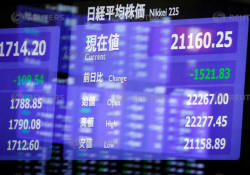Red October rumbles on ahead of U.S. jobs data
 Send a link to a friend
Send a link to a friend
 [October 05, 2018]
By Marc Jones [October 05, 2018]
By Marc Jones
LONDON (Reuters) - World markets steadied
ahead of U.S. jobs numbers on Friday, as a four-year high in oil prices
and the biggest weekly jump in Treasury yields since February left
investors wondering where to go next.
The usual drop in activity ahead of the monthly non-farm payrolls
couldn't prevent Europe's main bourses following Asia into the red - but
it wasn't the deep shade of crimson of the previous day.
Lingering worries about Italy's finances pushed Milan down 1 percent
again, while London's FTSE, Frankfurt's DAX and the CAC in Paris were
off 0.6-0.8 percent. [.EU]
Wall Street futures were also modestly weaker but it was the bond and
currency markets [/FRX] where the attention was really trained.
The dollar barely budged against its main sparring partners the euro and
the Japanese yen after testing a 10-week high, but rising bond yields -
which drive the global cost of borrowing - were causing a headache
again.
Benchmark U.S. Treasury yields were at a seven-year top of 3.2 percent
on their way to their biggest weekly yield rise since February as
European yields added to their biggest rise in months as well. [GVD/EUR]

And with talk of plenty more U.S. interest rate hikes growing louder, it
put all the more focus on the U.S. jobs data later.
Eaton Vance portfolio manager Justin Bourgette said though there was too
much hype around the payrolls figures, whichever way you approach it,
the U.S. labor market is currently super strong.
The latest Reuters poll sees 185,000 new jobs pushing the unemployment
rate to an 18-year low of 3.8 percent. Average hourly earnings are
expected to increase 0.3 percent after leaping 0.4 percent in August.
"Whatever the Fed's concept of the neutral interest rate is, it must be
rising," Bourgette said. "And it is going to be trial and error to some
degree (on how high rates go), because you just don't know where the
choking point is."
HOT OIL
Tied in with the rise in borrowing costs has been the latest spike in
oil prices, as energy costs tend to have an outsized impact on inflation
which is what most major central banks focus on when setting interest
rates.
Brent crude futures nudged around $85 barrel, and U.S. crude went quiet
at $74.5 a barrel. That kept both just under 4-year highs. They have
also risen an staggering 15-20 percent since mid-August. [O/R]
[to top of second column] |

An electronic board showing the Nikkei share average is seen as
market prices are reflected in a glass window at the Tokyo Stock
Exchange (TSE) in Tokyo, Japan, February 6, 2018. REUTERS/Toru Hanai

"Iranian exports could fall below 1 million barrels per day in November," U.S.
bank Jefferies said, referring to looming U.S. sanctions on Tehran.
The bank said there was enough oil to meet demand, but "global spare capacity is
dwindling to the lowest level that we can document ... meaning any further
supply disruptions would be difficult for the market to manage - and could lead
to spiking crude oil prices".
The painful combination of rising oil prices, borrowing costs and a climbing
dollar have also been rocking emerging markets which tend to be vulnerable to
all three.
MSCI's 24-country emerging market equity index was down 0.7 percent and headed
for its worst week since February and plenty of currencies were carrying heavy
losses too.
The Indian rupee fell to new record low after the central bank kept its interest
rates on hold despite clear inflation places. The rupee has been hammered by
higher oil prices, and is the worst performer in Asia this year.
Indian stocks also fell for a third straight session, dragged down by energy
firms, a day after the government announced a cut in fuel prices.
That cut sparked fears of the country going back towards the regulated regime
where the prices of diesel and petrol were controlled by the government. Petrol
prices were regulated until 2012, while diesel prices remained so until 2014.
A new Reuters poll also pointed to more pain for this year's worst performing
currency, the Argentine peso. It showed analysts think it could fall almost 20
over the next year, doubtful about the government's ability to tame inflation.
"In general, what's driving emerging market weakness is a stronger U.S. economy
... there is a lack of clarity on the effectiveness of rate hikes as a currency
defense," said Sunil Sharma, chief investment officer with Sanctum Wealth
Management.
(Additional reporting by Arnab Paul in Bengaluru; Editing by Hugh Lawson and
Raissa Kasolowsky)
[© 2018 Thomson Reuters. All rights
reserved.] Copyright 2018 Reuters. All rights reserved. This material may not be published,
broadcast, rewritten or redistributed.
Thompson Reuters is solely responsible for this content. |